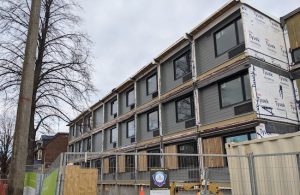
Housing challenge is an infrastructure challenge
By Adam Freill
Construction Infrastructure ResidentialFederation of Canadian Municipalities suggests $600 billion needed in municipal infrastructure investment to reach CMHC housing affordability target.
Amid calls for additional housing and housing related funding announcements in the federal government’s fall economic statement, the Federation of Canadian Municipalities (FCM) is warning that housing cannot be built without corresponding infrastructure to support it.
With Canada’s population growing at its fastest rate since the 1950s, and expected to surpass 41 million people next year, the need for additional housing stock is growing. According to Canada Mortgage and Housing Corporation (CMHC) figures, 5.8 million housing units must be built by 2030 to restore affordability to 2004 levels. This is 3.5 million above the 2.3 million units projected based on recent construction rates. New homes, however, are only part of the puzzle, says the FCM.
“Municipal infrastructure is a prerequisite to building more housing,” said Scott Pearce, mayor of Gore, Que., and president of FCM. “We cannot build new housing without putting in place the municipal water, wastewater, transportation and community infrastructure that provides the critical foundation for Canadians’ quality of life.”
New research commissioned by FCM estimates that, on average across the country, the cost of the municipal infrastructure required to support new housing is in the range of $107,000 per home. When considering the 5.8 million homes that the federal and provincial governments are directing municipalities to approve by 2030, the scale of the gap could reach an equivalent of $600 billion in municipal infrastructure investment.
“Municipalities have limited options to pay for growth,” said Mike Savage, mayor of Halifax and chair of FCM’s Big City Mayors’ Caucus. “Property taxes and contributions from housing developers, generally known as development charges, are most often the primary sources, and the most stable. Yet the rapid pace of growth, combined with high construction prices due to inflation, means the status quo is no longer keeping up, and the gap is getting wider every day.”
Increasing taxes and fees on property can increase the overall cost of construction, impact the business case for developers to start new projects and contribute to upward pressure on housing costs, however, FCM says that under the current framework, municipalities simply have no other way to fund the infrastructure that is essential to build housing.
As such, the organization is calling on the federal government to convene provincial, territorial and municipal leaders to discuss a new municipal growth framework that would better align municipal revenue with economic growth and population growth.
The federation says that new federal infrastructure investments need to be included in Budget 2024, adding that it has a list of recommendations, including scaling up the Canada Community-Building Fund and increasing its annual growth rate to bring it in line with economic growth. That, it says, would give municipalities a much-needed tool to address inflation and renew and expand infrastructure.





